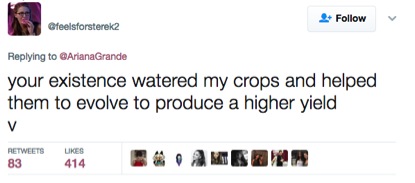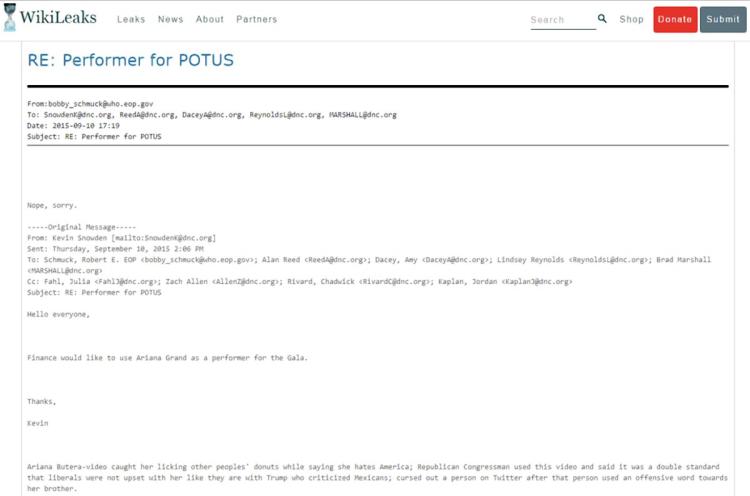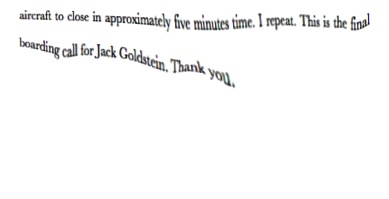Your EXISTENCE
WATERED MY CROPS
Unscrambling Perception
in Ariana GRANDE’s Dangerous Woman
in Ariana GRANDE’s Dangerous Woman
Jack Goldstein
Your existence watered my crops
and helped them to evolve
to produce a higher yield.
Your existence watered my crops
and helped them to evolve
to produce a higher yield.
and helped them to evolve
to produce a higher yield.
Those 83 characters made up a tweet sent by @feelsforsterek2 to @ArianaGrande at 10:43am on January 14th, 2017. It was the same date that, in 1785, Mozart had completed his String Quartet No. 19, nicknamed ‘dissonance’ because of its creeping, inharmonious opening movement. Realising this, I contemplate how my own relationship with Ariana was formulated.


Ariana Grande-Butera was born in Boca Raton, Florida, in 1993. Her parents were the graphic designer Edward Butera and Joan Grande, the CEO of Hose-McCann Communications. Originally, Grande became well known for her television work, being cast as Cat Valentine in the Nickelodeon television program Victorious. However, she continued to pursue musical interests as well and in 2013 released her debut album, entitled Yours Truly, on Republic Records.
I hadn’t heard of Ariana at this time. In 2013, I was trying to listen to as much music as humanly possible and whilst the absorption process percolated my every move, the music itself seldom coiled around my ligaments in anything ever resembling an everlasting love. I felt like everyone else was digesting music at a rate that I just couldn’t keep up with.Perhaps I did have Ariana on my iTunes somewhere. Perhaps if one were to excavate my internet history from 2013 they could salvage a Rapidshare link for Yours Truly. The truth is I wouldn’t be able to remember either way. I mindlessly listened to way more music than I could have ever hoped to have readily consumed in any lasting sense. My clawing of the now felt like a knee-jerk reaction to a musical close-mindedness as a teenager. I basically only listened to American punk music or alt-rock-from-Chicago. Even then my cultivation was cloistered into a succinct stockpile of certain bands and artists. Attempting to unpick such self-referential idiosyncrasies becomes torturous; a deeply entrenched confrontation of ones relative position in the social pecking order.
The focus of this writing is on my relationship with both Grande as a personality and how I became familiar with her through her third album, Dangerous Woman, which was released on May 20th, 2016. It is also a piece of writing about how pop music is discussed, both academically and otherwise.
This is a piece of writing best thought of as a first-person narrative in the vein of a video game like FIREWATCH or THE BEGINNER’s GUIDE. Interactive storytelling video games like these allow the player to explore unique narratives and philosophies through their interactions with the story world structured by the author. Keith Stuart, The Guardian games editor, put it best when he said that these kinds of first-person structural narratives could explore
“…the conflicted emotions of [the] lead character, while allowing the player to maintain a skeptical distance.”
I intend to sustain some kind of traditional academic structure but try, if you will, to puncture through the systematised pixilation of rigor to something more corporeal.
Why do I love this music?
What am I attempting to unearth with this writing?
It can’t be said that the mechanisms of both Grande and her music are as easy to critically analyze on a political level as say Beyoncé or Madonna. Why is it that I feel I have to vindicate Grande’s music either politically or academically so as to be able to say that I like it? I mean, I clearly don’t/do.
Wending from the dense rust-belt storage vats of regional memory to the muscle beach blues of Ariana’s palm beach home turf; I am trying to rummage within the framework, hoping I’ll prick my finger on something that will present itself as either euphorically beautiful or bat shit crazy. Something to unlock the QR code on my heart. Perhaps it will be neither; perhaps it will just be a metaphysical liner note.
i. Focus
Grande announced her third record only months after the release of her second, titled My Everything, in August of 2014. At this point the record was titled Moonlight, as opposed to a Dangerous Woman, and it would be revealed later that both were in fact song titles touted for inclusion in the final track listing. By January of 2016, Grande had decided upon the title change, stating that“A really long time ago,
I was convinced that it was going to be called MOONLIGHT,
because its one of my favorite songs that we did for the album….
& now,
as we’re wrapping things up,
of course I’ve been writing and singing,
we’re at the final stretch….
Now there’s this other song that has thrown me for a whirlwind and I love it so much,
it’s changed everything.”

Grande finished work on the album on January 21st, 2016 and the record was released on May 20th, 2016. It was around this time that I first heard Focus, the track that was originally intended to be the lead single for Dangerous Woman but was eventually left off of the track listing for the standard eleven-track edition of the album.
‘Focus’was released in October of the previous year but had evaded my attention. My first encounter with it was on a late afternoon coffee retrieval in the Elephant & Castle Shopping Centre. As the first covered shopping centre in Europe, opening in 1965, the original sales brochure for the mall boasted that it would be...
“The largest,
& most ambitious, shopping venture ever to be embarked upon in London.”
& most ambitious, shopping venture ever to be embarked upon in London.”

The lusting, saccharine pseudo-sample (completed by fake vinyl crackle) that permeated throughout the entirety of the track was part Alan Lomax, part Amerie and part KC & The Sunshine Band, the latter of which also appeared to imbue the pre-choruses chord progression. Two minutes later and it was over. The timeworn trimmings of The Elephant and Castle had metamorphosed into an American utopic (or perhaps uchronic) spectacle; a failure kept alive by a pop culture sensibility. Standing opposite the shopping centre, Metro Central Heights, the multi-story office complex designed by Hungarian-born modernist architect Ernő Goldfinger, was all at once recast into glorious Technicolor as a small Cessna 172 Skyhawk flew overhead with an aerial advertisement trailing from it that simply read: “focus on me.”
ii. Dangerous Woman
By the time I came to actually obtain a copy of Dangerous Woman, I’d learnt a few other things about Grande in the lead up to the release of the record. I learnt that in the same week she had announced the title of the album she had also posted to Instagram a photo of Nawal El Saadawi, the Egyptian feminist writer and activist, with a caption that read:They said,
“You are a savage and dangerous woman.”
I am speaking the truth.
And the truth is savage and dangerous.
The quote was taken from Saadawi’s 1975 novel, Woman at Point Zero, which is about Saadawi's own encounter with a female prisoner in Qanatir Prison who endures arranged marriage, genital mutilation, forced prostitution and eventually murders her captor.
Initially, I found the relationship between the subject of Saadawi’s writing and that of Grande’s title track quite tenuous, and superficially offensive. However, as my relationship with both Ariana and the record blossomed, I began to understand things differently.
The first time I had heard the track Dangerous Woman was when I listened to the album in its entirety for the first time whilst awaiting to board a flight to Barcelona in July of 2016. Flight O11Q8B from London Stansted had been delayed by nearly four hours and I’d found myself in the Stansted Airport Escape Lounge, fittingly named owing to my almost immediate desire to escape it. I stretched myself out over four small seats in the corner of the far right hand corner of the lounge and, using my bag as a makeshift pillow, attempted to relax whilst I listened to some music.

The album opener, Moonlight, came and went. It felt like an intro piece that had been protracted to an uneasy three and a half minutes. Labored perhaps, but after the first minute it began to remind me of the music that Sissy Spacek and William Katt dance to at the prom in Brian DePalma’s Carrie. I loved Carrie, but this post-internet-prom-pop wasn’t the soundtrack that I was looking for in the Escape Lounge.
Dangerous Woman was up next. This track had a slightly off-kilter waltz drag which, twinned with the ersatz gospel organ that ran through the verse, ticked all the right boxes in that precise moment. It reminded me that pop music was a pollutant. On record, it has an aroma that possesses both the ability to disengage the wary cynic or zealously bear hug the consenting admirer into a sugary love fuck. Both appear morally and aesthetically resolute and devoid of physical or spiritual assent. It is an infernal machine camouflaged as a Pizza Hut Ice Cream Factory. Fall victim to the enslaving treacle of Dangerous Woman and you find that within the moment of auscultation, you can be beauteously succumbed.
I had forgotten all about the dismal environs of the Escape Hatch (sic) and had instead become fixated on the lulling, sublime laziness of the vocal refrain over a post-chorus trap beatl; I could have made-do with this ten second refrain on a loop if I’m honest.
ALL BAD GIRLS WANNA BE LIKE THAT
BAD GIRLS UNDERNEATH LIKE THAT
YOU KNOW HOW I’M FEELING INSIDE?
BAD GIRLS UNDERNEATH LIKE THAT
YOU KNOW HOW I’M FEELING INSIDE?
The feminist musicologist Sheila Whiteley observed that the 1990s were characterized by...
‘the cult of the disconnected fragment,
the fashion for a free-floating identity politics,
in which we are all at liberty,
apparently,
to be who we want to be.’
This relationship ran through into the 21st century and sovereignty of individuality became a popular lyrical strand within many mainstream pop songs. Christina Aguilera sang about becoming stronger and working harder as a result of distrust. Britney Spears made it clear that if a person wanted a ‘hot body’, a ‘big mansion’ and to ‘live fancy’ then they must do as she did and ‘work bitch’. In part an extension of Tom Wolfe’s so called ‘Me Generation’ as well as a clear socioeconomic facet of private ownership and the self under neoliberalism, it appeared as if collective revolutionary emancipation had been supplanted by individual rights, self interest and competition.
However, perhaps Grande’s external actions should be considered part of the musical structure as well. If we reduce our perception of Dangerous Woman to its four-minute duration, or even the record in its entirety, we ignore the culture of celebrity accompanying it that is so well cultivated to be part of the overall interpretation.
If we see Grande’s vindication of Saadawi as one part of the overall purpose of Dangerous Woman as opposed to one aspect within a series of unrelated elements that are independent of it then the entire project is more akin to the Audre Lorde quote that there is...
No such thing as a single-issue struggle,
because
we do not live single-issue lives.
…unitary,
mutually exclusive entities,
but rather...
reciprocally constructing phenomena.
Therefore, Grande’s music, and ultimately herself as the narrator, should be seen as being inextricably linked with all the other elements that make up her public identity as well. It is these larger and constantly shifting force relations that characterise the importance of political movements, ideologies, and social movements within the terrain of mainstream pop music.
For example, Beyoncé’s 2016 album Lemonade draws similar individual, if perhaps more explicitly personalised, narratives to that of Aguilera and Spears but the carapace around her has undeniably done much good to draw attention to the Black Lives Matter movement and social inequality. The same could be said of Lady Gaga and LGBT+ issues. Grande’s Feminism operates in a similar way and this highlights the power that mainstream pop music has when it acts upon such issues. The music writer Sophie Atkinson wrote a piece about Dangerous Woman for Bustle in 2016 and said that:
“The tonality reminds me of an advertisement or a horoscope: it's vague enough to be universal. Who doesn't want to test their own limits? Who doesn't want to take control of this kind of moment? The text is so unspecific as to be totally meaningless, and it's hard to be empowered by something that could apply to just about anyone in the known universe.”
Atkinson’s analysis of the lyrical content of Dangerous Woman treats it as if it operates within a vacuum whereas in reality Grande’s musical output establishes itself concurrently with countless other consistently prominent means of output that define her identity and opinions as well. The obvious and perhaps most salient example being social media.
iii. The Escape Lounge Incident
I was awoken from my tangential meditations on Grande by a pre-boarding announcement for my flight.
Good Afternoon Passengers,
This is the pre-boarding announcement for flight O11Q8B to Barcelona.
We are now inviting those passengers with small children, and any passengers requiring special assistance, to begin boarding at this time.
Please have your boarding pass and identification ready.
Regular boarding will begin in approximately ten minutes time.
Thank you.
My daydreaming had seen the album repeat itself half a dozen times or more without me noticing and it was now playing the title track yet again. There were ten minutes till regular boarding commenced and I wasn’t certain how close my boarding gate was. I rolled onto my side and went to arch my body off of the affixed faux Bofinger chairs I had been resting upon. Stretching my arms forwards I noticed that my legs had decided not to react as they normally would. No matter how hard I tried, I couldn’t lift myself from my current state.
I looked around the Escape Lounge. It was different somehow, as if the mythos of bleakness I had constructed upon my initial arrival had heard my thoughts, taken offence and had opted to harvest itself even further into the eternal downpour of melancholy that was a Tupperware buffet of ‘Greek style’ yoghurts and mini pastries. Whereas Elephant and Castle shopping centre had reconfigured itself as a tableau of blissful star spangled Niagaras’, the Escape Lounge was doing the opposite.
I thought the lounge was empty. The fiendish, transformed, unknown thickening that inched itself into everything around me continued to be accompanied by Dangerous Woman.
ALL BAD GIRLS WANNA BE LIKE THAT
BAD GIRLS UNDERNEATH LIKE THAT
YOU KNOW HOW I’M FEELING INSIDE?
BAD GIRLS UNDERNEATH LIKE THAT
YOU KNOW HOW I’M FEELING INSIDE?
Slowly, all natural light evaporated and a spotlight focused in on an approaching figure. I still couldn’t move.
Ariana sat next to me and her voice came through my headphones like an ASMR video on YouTube. The volume of the accompanying music dimmed ever so slightly so as to accommodate it. She leant in and looked me dead in the eye, her Disney club oculi narrowing to that of a sober peep. She pensively raised her index finger to her cheek and whispered,
America,
with their good command of the Bible,
knows well enough that man,
unless by elective grace a capitalist,
is destined to eat his donuts in the perspiration of his brow.
What they don’t know
is that he has to eat daily in his donut
a certain quantity of human exploitation as well.
I HATE AMERICANS.
I HATE AMERICA.
I HATE AMERICA.
The subsequent release of the security camera footage prompted national outrage, causing an email to be leaked by Wikileaks in the 2016 Democratic National Committee leaks that stated that because she had licked the donuts and said she hated America she would no longer be allowed to play at a gala performance for the president. I gazed at her, totally dumbfounded. I still couldn’t move my legs but knew that, were I able to, I wouldn’t want to be anywhere else but in Stansted Escape Lounge right now, minutes from missing my flight. I wondered why Ariana had told me about the donut incident. Perhaps, in some sense, it could help to further realise my relationship with her music. I began to work this over in my head.
*
In his book of the same name, the cultural theorist Mark Fisher describes his concept of “capitalist realism” as...
‘The widespread sense that not only is capitalism the only viable political and economic system, but that it is now impossible even to imagine a coherent alternative to it.’
In a video lecture he gave on September 7th 2014, titled Reoccupying the Mainstream, Fisher said that...
‘What we have seen since the nineties is a tendency for the left to be associated with marginality and opposition.
We require a positive political project to control and to manage society in a better way, with a view to seize the means of reality production back, eventually constructing a new reality.’
Fisher advocates for the left to work within the mainstream.
How then has the left disseminated itself within the mechanism of contemporary mainstream pop music?
*
Well, surely Ariana’s denunciation of all things sugary and American counts for something doesn’t it? After all, it did get her banned from The White House.
That’s an act of political descent that has till now evaded messrs Springsteen and Dylan.
Could a politicised form of mainstream pop music be the impetus for some kind of real social change?
Or is the assimilation of social and political struggle into mainstream pop
simply a way of diluting palpable struggle into cultural capital?
She arched her back to one side, gazed up towards the sterile fissured ceiling tiles and said...
I can hear your mind waxing theoretical.
I can hear these questions arising.
Is that anything to do with the feeling galvanized by my music?
You don’t even really listen to the words do you?
I can hear these questions arising.
Is that anything to do with the feeling galvanized by my music?
You don’t even really listen to the words do you?
[She was right, I didn’t]
I was starting to lose my patience.
The cloyingly sweet intoxication that had once been was now supplanted by a delayed fear.
Why did I have to be so violently rendered immobile against my will?
The cloyingly sweet intoxication that had once been was now supplanted by a delayed fear.
Why did I have to be so violently rendered immobile against my will?

Ariana sat looking blankly at me. She didn’t batter an eyelid. As I pondered my incapacitation, I also evaluated my feelings. The cloyingly sweet intoxication was akin to that divine ascension reached by listening to a certain pop song. Perhaps the violence was part of that as well.
Is this what Ariana is trying to show me?
If pop music is perceived as reductive then it runs in direct opposition to traditional views of academic and intellectual practice; thus rendering itself no longer compatible with scholarly rational. Whilst attitudes towards violence obviously fluctuate in prudency depending upon forethought, it is simply the perception and compatibility of thinking about disparate things in accordance with larger ideological constrictions of how we, as human beings, view one another. This is the same with pop music. It is the perception itself that is reductive, not the music. Allen Chun and Ned Rossister describe this best in their book Refashioning Pop Music in Asia, noting that ‘The development of pop music culture… is not just a confrontation between different kinds of music but rather a synthesis created by social meanings placed on music as well as institutional clashes that aim to promote music in ways that galvanize different vested interests.’
In this sense, pop music displays itself like violence. A last resort for the culturally replete, a jewel case of concepts rendered malleable by cigarillo chewing desk mammals in ivory towers: capitalisms blunt knife. However, both violence and pop music must be evaluated, and on occasion justified, by a more rigorous and individual level of critical analysis.
Yes—now I understood what was happening to me.
It all made sense.
If only I…
It all made sense.
If only I…
*
THIS IS THE FINAL BOARDING CALL FOR JACK GOLDSTEIN;
BOOKED ON FLIGHT O11Q8B TO BARCELONA.
PLEASE PROCEED TO GATE 3 IMMEDIATELY.
THE FINAL CHECKS ARE BEING COMPLETED & THE CAPTAIN WILL ORDER THE DOORS OF THE...

Fuck. I was going to miss my flight. Why, when all of these outlandish and otherworldly phenomena began, couldn’t time have stood still as well? Instead, I was going to miss my flight and no one would believe why. Ariana looked perturbed. She could hear my inner musings and was about to throw them to the wind. Grabbing me by the arm, she said...
“Emotion, properly understood, is the whole works involved in evaluating a situation: our cognitive appraisal of it, our physical feelings about it, and our subsequent choices in expressing our approval or disapproval and acting on it. Knowledge is always accompanied by feeling, and vice-versa; we don’t know anything about an event without feeling something about it.”
Hearing this, I wanted to be able to explain in words that candied, exhilarative gratification I got not only from Grande’s Dangerous Woman but also from so many other fantastic pop records. At that moment, in the Stansted Escape Lounge, I begged to wish away the scholastic never-never that clawed itself beneath my epidermis and into the moral fiber of a written page. I could no longer communicate. I felt as if @feelsforsterek2 had summed it up so well.
The feeling, not only provoked by listening to Grande’s music, but also by her sheer existence had, itself, taken on a tangibility that was radical and invigorating. Dangerous Woman, like so many other blissful pop offerings, momentarily suspends reality so that one can, just for a brief and beatific moment, get past the feeling that the modern world is either a desolate wasteland of impaired perceptions or an uncanny heterotopia. A dream sequence for someone collapsed in an elevator at Trump Tower is transmogrified into a beautiful future, a watered crop or, perhaps even, a savage and dangerous truth. Ariana was gone now, and so was I.
Jack GOLDSTEIN is a musicologist studying a masters in Contemporary Music Studies at Goldsmiths University. He was awarded The Bob Gilmore Prize for Outstanding Work in Musicology for his dissertation on the influence of politics and the fallout of the UK Miners’ Strike on the British brass band movement.
